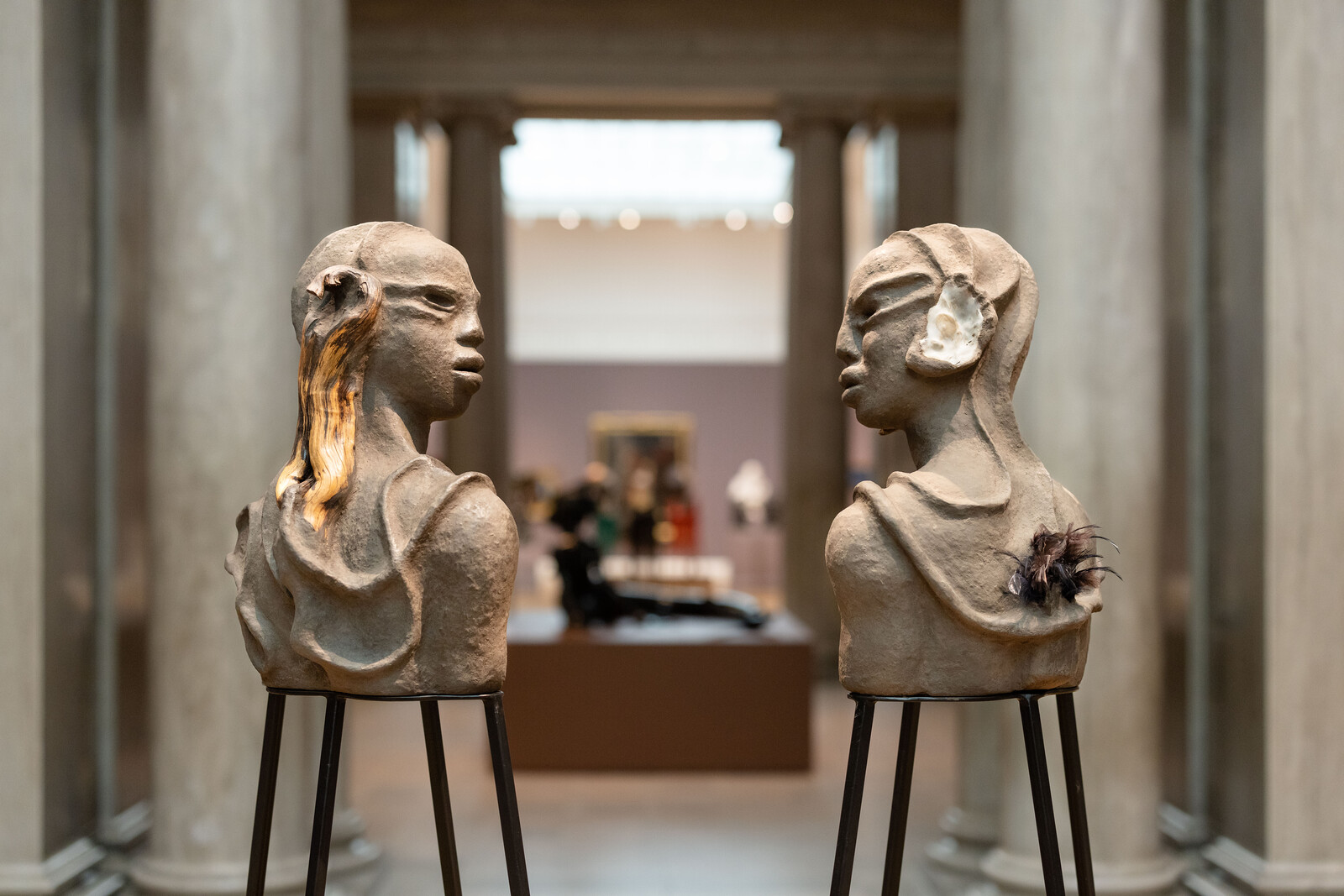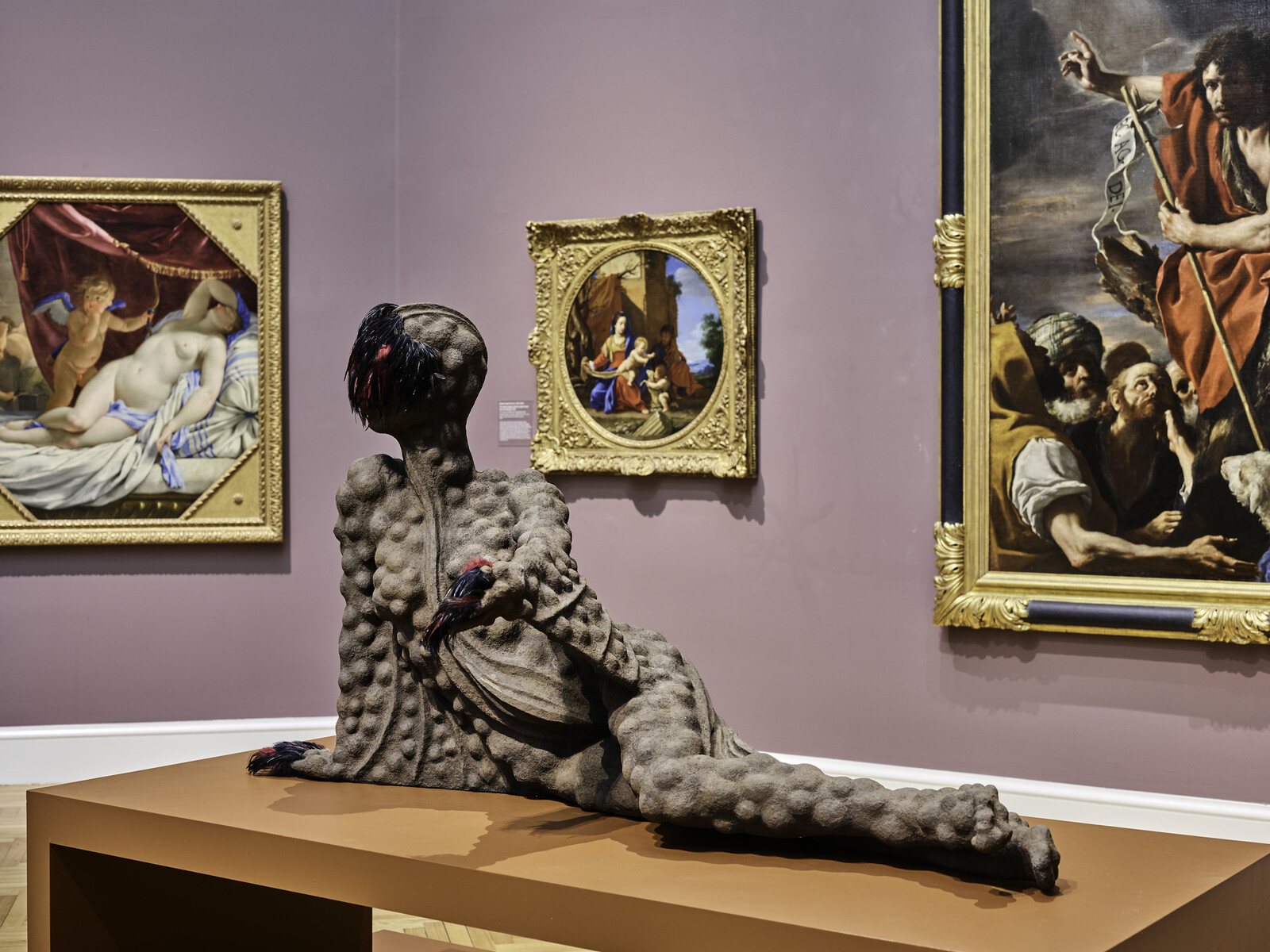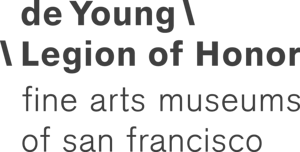I Am Speaking, Are You Listening?
May 7–November 7, 2021
100 34th Ave
San Francisco, CA 94121
USA
Wangechi Mutu creates constellations of hybrid female figures and fantastic landscapes that take the viewer on journeys through material, psychological, and sociopolitical transformations. An artist who calls both Nairobi and New York City home, Mutu moves voraciously between cultural traditions to challenge colonialist, racist, and sexist worldviews with her speculative projection of an alternate universe informed by feminism, Afrofuturism, and the Symbiocene.
Driven by a unique understanding of the need for new mythologies, she eschews the common distinctions between states of being, seeing, and being seen, instead harnessing the productive friction generated by their collision. Mutu’s exhibition at the Legion of Honor, entitled I Am Speaking, Are You Listening?, is exemplary of her capacity to construct imaginary worlds that spur a purposeful examination of and dialogue between multiple traditions and histories, using the power of art as a technique for archiving and remembering.
Remembrance is at the core of Shavasana I and Shavasana II, two bronze sculptures of female figures lying face-up on the ground beneath Auguste Rodin’s The Thinker (1904). Their bodies are covered with a carefully woven sheath, leaving only their extremities visible. The shine of their polished fingernails and the bright colors of their stilettos stand in harsh contrast to their limp limbs, bespeaking a sparkle of life prematurely taken.
The making of these sculptures was triggered by the murder of Nia Wilson, an 18-year-old teenager from Oakland, California, on July 22, 2018. News of Wilson’s gruesome death at the hand of a knife-wielding white stranger who attacked her and her sisters at Oakland’s MacArthur BART station went viral, sparking national public protests and vigils. Mutu’s sculptures transcend specific reference, however, instead serving as a haunting reminder of the systemic silence around the countless murders of people of color, in particular those of girls and women, who exist in the margins of power.
Named after the corpse pose in yogic practice, in which a symbolic death is reenacted as a condition for restoration, the works demand acknowledgment and reckoning, acts essential to change and healing. By laying these sculptures at the base of and in the sightline of The Thinker, Mutu wrests these deaths from their cultural invisibility, making them the subject of his, and thus our, contemplation. The “us” implied here is, of course, that of the Western world, whose colonial exploits and marginalization of both people and planetary resources forge the ongoing subtext for its stories of progress and modernization, the dismantling of which has only just begun.
Joining the Shavasanas in the Court of Honor are MamaRay and Crocodylus, chimerical creatures that metabolize ancient legends and lived realities into images of feminine might. Both blend the bodies of humanoid females bearing the “alien” traits of Afrofuturism with fantastical iterations of the fearsome water-bound animals alluded to in their titles. Standing guard, MamaRay and Crocodylus are warrior deities risen from the artist’s mind to symbolically protect the powerless, the disenfranchised, the repressed, whose ongoing sacrifices the Shavasanas commemorate.
These warriors’ protective reach metaphorically extends to Water Woman, a mermaid-like figure sitting atop a pedestal in the rotunda of the Legion of Honor’s entrance. She pays homage to the folkloric pantheon of water spirits present in many world cultures, including the Zimbabwian Njuzu, the Somali Gabaray Maanyo, the Yoruban Yemoja, the pan-African Mami Wata, and, in particular, the Nguva from East African folklore.
Like her many sister spirits she is often portrayed as an alluring huntress of lost and weak souls. Mutu’s rendition, however, undercuts the narrative of the deathly temptress—a universally ubiquitous role assigned to women throughout history. Endowing her with delicate, almost childlike features and an introspective gaze that trails off into the distance, Mutu reframes the Nguva’s power in terms of a life affirming resiliency and dignity.
Within the galleries of the museum, Mutu introduces figures made of soil, wood, shells, and gems indigenous to the Kenyan landscape. Reflective of traditional techniques used in the making of African sculptures, ornaments, and battle shields, they also incorporate allusions to lip plating and scarification as an ancient form of both art and archive. Dispersed through the galleries, sculptures like I am Speaking, Can you hear me?, Mirror Faced I, II, III, Outstretched, Sentinel IV, and Seeing Cowries invite the viewer to contemplate the possibility of a world defined by understanding and care.
Acknowledging the enormity of the task ahead, Mutu’s new film My Cave Call features her in the guise of a horned mythic creature seeking wisdom from the bowels of a holy cave in the Rift Valley of Kenya. Her performance, paying homage to traditional rituals of truth seeking, is both a dance and a prayer. In concert with her apse-like installation of Prayers in the main Rodin gallery, it gives shape to her belief in and love for the divinity of the earth, the power of woman, and the potential of art to bespeak and redress the injustices of this world.
View the media image gallery here.
Annual Bransten Lecture with Wangechi Mutu: a lecture by Wangechi Mutu on occasion of the exhibition is available for viewing on the museum’s Youtube channel.
Wangechi Mutu: I Am Speaking, Are You Listening? is organized by Claudia Schmuckli, Curator in Charge of Contemporary Art and Programming at the Fine Arts Museums of San Francisco.
Presenting sponsor: Lisa & Douglas Goldman Fund. Major support: Ford Foundation, Gladstone Gallery, New York and Brussels. Significant support: Victoria Miro, London and Venice. The Contemporary Art Program at the Legion of Honor and the de Young museums is made possible by the Contemporary Support Council of the Fine Arts Museums of San Francisco.
Media inquiries: Helena Nordstrom \ hnordstrom [at] famsf.org





